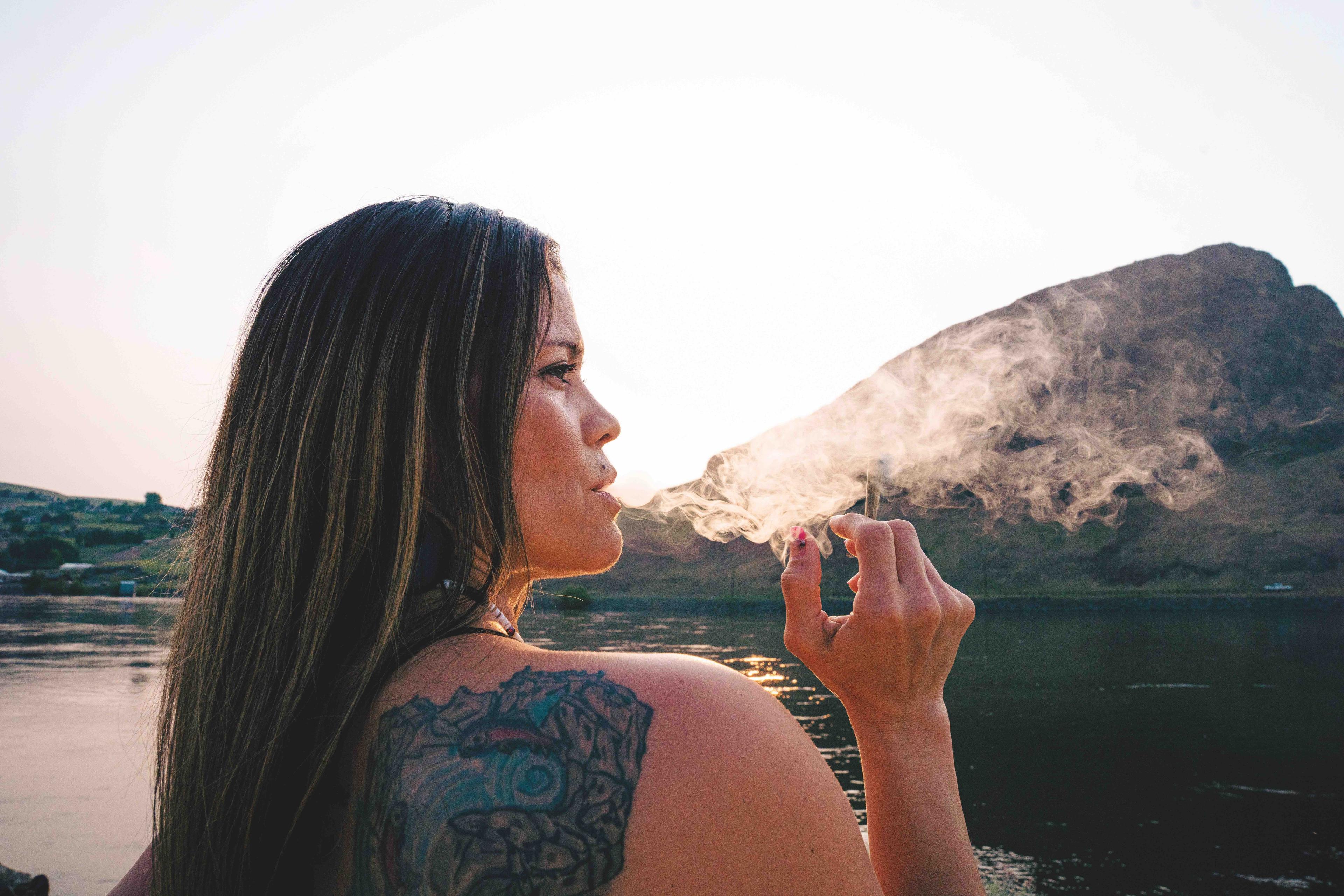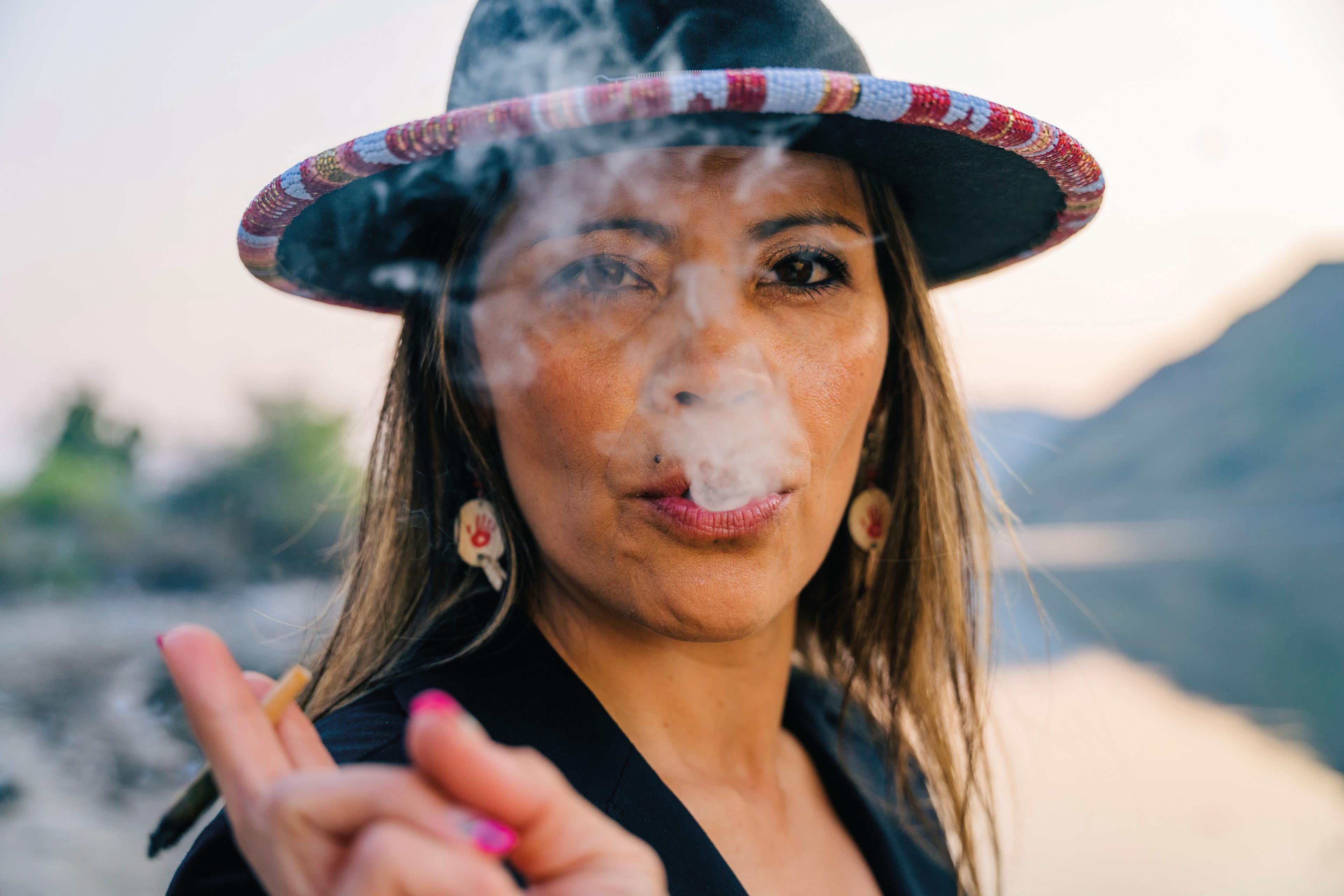6.1.2023
SEASON SUMMER 2023 | COLLECTION ArchiveCANNABIS AND SOVERIGNTY
CANNABIS AND SOVERIGNTY
Santiago R. Tarditi
Photo Credit: Photos by Pox

Young Mary Jane Oatman, founder and executive director of the national Indigenous Cannabis Coalition (ICANNC) and Tribal Hemp & Cannabis (THC) Magazine
"It’s been a wild week,” says Mary Jane Oatman, founder and executive director of the National Indigenous Cannabis Coalition (ICANNC) and Tribal Hemp & Cannabis (THC) Magazine, during a video call. “And it’s only Monday,” she adds with a grin, clearly accustomed to multitasking. Oatman’s life is a whirlwind of activity — from lobbying and fundraising to education and content production — all in support of cannabis, a plant with deep roots in her community and family for generations.
Oatman founded ICANNC in 2019 to address the needs of tribes and promote education on tribal sovereignty. She supports local, state, and federal legislation that protects the rights of Native American tribes to participate in sustainable economic development that includes traditional plants and materials.
As a descendant of the Nimiipuu people, a Native American tribe from the Pacific Northwest (specifically, Idaho), Oatman grew up surrounded by diverse ecosystems and learned early on the importance of honoring the land and maintaining harmony with nature.
“I was born and raised on the Nez Perce Indian Reservation in Idaho and come from a large family that has always honored plant medicine as sacred. My passion for plants has been a part of my DNA, and I have been blessed to be connected since I was a young girl helping my dad with backcountry grows,” she says. “We had to be extra stealthy because my maternal grandparents had both been indicted and convicted of marijuana-related offenses (my grandmother went to federal prison and my grandpa to state prison).”
Cannabis, endemic to Central Asia, was introduced to the Americas by European explorers and traders in the 16th century, who eventually bartered with Indigenous communities who had their own traditional plant medicines. The Nez Perce Tribe in Idaho, like many other tribes in the region, was likely exposed to cannabis through trade and interaction with European settlers. Today, the scars of the war on drugs run deep within Indigenous communities, much as they do within the Black and Latino populations who have also suffered the brunt of its devastating impact. As the federal government continues to hold sway over Indian reservations, tribal citizens find themselves ensnared in a complex web of legal systems that often result in the double jeopardy of facing charges in federal and tribal courts. This systemic injustice has taken a heavy toll on the lives of individuals like Alice J. Warden, Oatman’s grandmother, who served time in federal prison for growing cannabis.
After her release, the Oatman matriarch had to declare her convicted status on numerous applications, a requirement that haunted her for years. In her seventies, she faced the indignity of disclosing her felony conviction on her Free Application for Federal Student Aid when she decided to return to college. Later, as she sought employment in hospitality at the Nez Perce tribal casino, she was required to declare her status to get an Indian gaming license. Her past conviction currently renders her ineligible to even cultivate hemp on her land under the farm bill rules.

“We are not waiting for permission, but rather standing together with a cease-and-desist order to demand that colonial practices stop intervening with our healing journeys.”
The story of Oatman’s grandmother reflects the experiences of millions and is one reason Oatman founded ICANNC to achieve extensive, systemwide expungement procedures and introduce exclusionary language that ensures individuals with marijuana-related convictions are no longer burdened by the need to disclose their criminal record. Her drive for changing the reality of her people keeps her going seven days a week, starting at 6:00 a.m. and wrapping up final calls and meetings after dinnertime. Since she became executive director of the Indigenous Cannabis Industry Association (ICIA) — a nonprofit organization that supports Indigenous entrepreneurs and businesses in the cannabis industry through education, advocacy, and networking opportunities nationally — in July 2022, significant progress has been made in outreach and partnership building within and beyond Indian country, leading to policy and research development, as well as participation in roundtables that previously excluded tribal voices.
Oatman’s advocacy for regenerative cannabis in a fast-paced industry that seeks to maximize the output (without considering the resources consumed) is focused on returning the plant to the sacredness it had before being commoditized, commercialized, and destroyed. Part of her quest involves shedding the negative stigma around the plant and its consumers, respecting its healing essence even as cannabis remains illegal in Idaho and federal authorities often trespass into Indigenous territory to raid small grows that guarantee the community has access to this natural medicine. “We have never given up the plant, despite the government’s intrusion into our healing processes,” she says. “That’s why there’s such a disproportionate number of our people in federal prison over marijuana.”
As the cannabis industry is projected to grow to a multibillion dollar scale, Indigenous communities have the opportunity to unite in presenting their concerns and reject the White-man-led colonized approach to industry building to resist corporate grabs aimed at commodifying cannabis. Oatman’s community considers it a sacred sister plant that requires Indigenous peoples to advocate for her protection, recognizing it as part of a grander ecological and spiritual effort that in turn protects the water, soil, flora, and fauna.
“Hemp was a part of the Nez Perce story of creation; the [natural] landscape is basically our church with the gifts left to us by our Creator as our sacrament,” she says. “This includes plants and medicines. Our people have had a very long-standing, historically documented relationship with smoke. It’s in the journals of the expeditions that crossed through our lands; in specific notations, it’s clear that the smoke is of a variety far different than the White man’s tobacco.” To her, the impact of cannabis legalization on Indigenous autonomy and self-determination brings to the forefront matters of individual sovereignty versus tribal sovereignty.
For example, elders who receive tribal health-care services and live in states with access to top-notch medical cannabis programs often find themselves forced to choose between chemotherapy and cannabis due to obstacles in federal health care. Oatman says that some tribes, refusing to be held back, have taken matters into their own hands. They’ve chosen to forge their own paths, sidestepping federal mandates and policies to provide cannabis care for their communities. In doing so, these tribes lead the way in research and health-care aspects of cannabis, working diligently to prove its efficacy and provide essential data and analysis.
This autonomy is the result of a cosmology that acknowledges the Indigenous approach to working with nature — their cannabis cultivation follows a regenerative approach that considers an interconnection between all the elements involved, honoring the plant’s full development and life cycle.
“Cannabis cultivation for commercial purposes has taken on a whole new life. It’s all about maximizing outputs and profits,” says Oatman. “But that is not the case for a majority of my friends and relatives who cultivate for medicine; come harvest time, they struggle to end the plant’s life cycle.
“My brother, for example, takes such great care in drying and curing that when it is time to try the different strains, he reconnects and has a follow-up conversation to thank them for all they do,” she continues. “And then he gives a shitload of his medicine away to elders and families in need of medicine so they do not have to travel 75 miles one way to a dispensary and face what we call the ‘gauntlet’ of Idaho State Police and local county and municipal officers.”
Most of modern society forgets that where we thrive today was once someone else’s land and we have yet to remunerate the Indigenous people for a history of pillaging and erasure. To address this issue on a global scale, Oatman is developing collaborations across nations to create a unified Indigenous voice.
The ICIA is actively participating in putting together an Indigenous cannabis conference in 2025 in Cape Town, South Africa, and has already joined New Zealand’s Indigenous hemp and cannabis community members in presenting at an Earth Day event. “We are marginalized due to our smaller numbers, but we are vocal and lead with facts and evidence to support that this is a proprietary place for our Indigenous smoking and plant sacrament communities to lead,” says Oatman. “We are not waiting for permission, but rather standing together with a cease-and-desist order to demand that colonial practices stop intervening with our healing journeys.”
For Oatman and her community, the struggle for recognition and respect is more than just a fight for their right to cultivate and consume a sacred plant — it’s a battle for the very soul of their people.